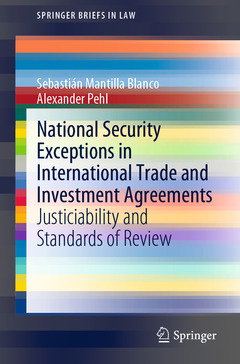Description
National Security Exceptions in International Trade and Investment Agreements, 1st ed. 2020
Justiciability and Standards of Review
SpringerBriefs in Law Series
Language: English
Subjects for National Security Exceptions in International Trade and...:
73 p. · 15.5x23.5 cm · Broché
Résumé
/li>Sommaire
/li>Biographie
/li>Commentaire
/li>
This book provides a comprehensive analysis of national security exceptions in international trade and investment agreements. The subject has gained particular relevance in the past few years, as both the United States and the Russian Federation have invoked national security as justification for trade-restrictive measures in the context of WTO dispute settlement proceedings. The book describes the evolution of security exceptions in international economic law, from the GATT 1947 to the most recent economic treaties, such as the 2017 Buenos Aires Protocol for Intra-Mercosur Investment and the 2018 USMCA. Further, it presents an overview of the rich array of adjudicatory practices addressing national security clauses, covering the decisions of WTO dispute settlement bodies, the ICJ, and numerous investment arbitral tribunals. To this end, the book addresses the debates surrounding the alleged self-judging character of security exceptions and the standards of review applicable where the exception is considered to be justiciable.
Sebastián Mantilla Blanco holds a law degree (Abogado) from the Pontificia Universidad Javeriana (Bogotá). After working at the international arbitration team of a law firm in Colombia, he pursued postgraduate studies at the University of Bonn, obtaining a Magister Legum (LL.M.) in 2015 and a doctorate in law (Dr. iur.) in 2018. He currently works as a Postdoctoral Researcher at the Institute of Public Law of the University of Bonn.
Alexander Pehl studied law at the Universities of Münster and Seville. After graduating in 2014, he worked as a Research Assistant at the Institute of Public Law of the University of Bonn. In 2018, he obtained a doctorate in law (Dr. iur.) with a thesis on representative treaty interpretation. He currently is a law clerk at the Higher Regional Court of Cologne.
Provides a comprehensive analysis of national security exceptions in international trade and investment agreements
Gives an overview over the rich array of adjudicatory practice addressing national security clauses
Addresses the debates about the alleged self-judging character of security exceptions and the standards of review applicable




